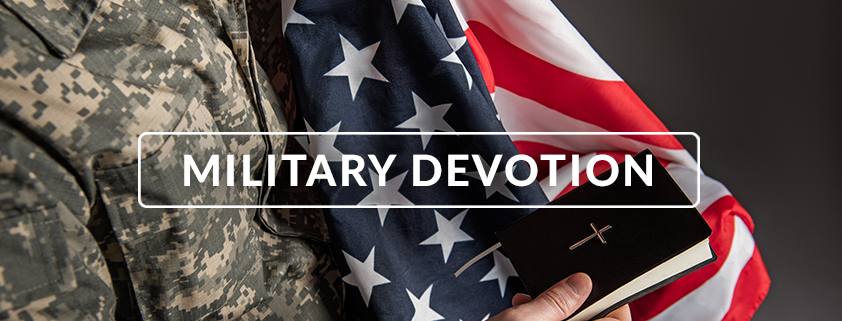Desertion! – July 29, 2022
Desertion! – July 29, 2022
Do your best to come to me quickly, for Demas, because he loved this world, has deserted me and has gone to Thessalonica.
2 Timothy 4:9,10
Devotion based on 2 Timothy 4:9,10
See series: Military Devotions
Desertion brings shame. In times of war, it may bring death by a firing squad. But before one can desert, one must first belong.
On the opening day of the First Battle of Bull Run, citizens of Washington, D.C., came out to Manassas to enjoy the event as spectators. When troops of the South overran the Northern forces, the civilians quickly turned their horses and buggies around and scrambled back home with the battle following them.
They did not desert. They evacuated.
When the bugle sounded to call the army of the Confederacy back to a more secure position for the night, they did not desert. They withdrew.
When the Union soldier panicked at the sight of the Rebels pouring over defensive lines, threw his rifle down, left others to deal with the threat, and ran back to D.C., this was not a retreat.
This was desertion.
He belonged at the front. He belonged at his post. He belonged at the edge of the creek called Bull Run to fight shoulder-to-shoulder with his comrades.
His desertion was despicable.
So was the desertion of an early Christian named Demas.
The apostle Paul wrote to young Timothy, “Do your best to come to me quickly, for Demas, because he loved this world, has deserted me and has gone to Thessalonica.”
The apostle was in prison at Rome, awaiting a trial that would order his execution. In this letter, he begs Timothy to hurry to his side.
Timothy may have read and reread this last letter with tears blurring his eyes, but every line braced him with the power to make him bold in the battle against the old evil foe and his forces of darkness. He was encouraged to fight to the death so that he might receive the crown of life waiting for him.
He would rush in where Demas did not want to stay.
In his letter to the Colossians, Paul wrote, “Our dear friend Luke, the doctor, and Demas send greetings.” He calls Demas a fellow worker in his letter to Philemon. We wonder how someone who had served so well in the work of the Lord could turn his back on it.
The apostle provides the answer with the words, “because he loved this world.”
Desertions at Bull Run may have been caused by fear. The desertion at Rome was driven by love—love of the world.
We can understand that. There is much in this world that appeals to us. Much of that is not wrong. The good things in life are God’s gifts to us.
The bad things of the world do not spring from God though this world seems saturated with them. Yet, this also appeals to us. Sin, in many forms, calls out its invitation to taste the forbidden fruit. Our sinful nature wants to run to it. But to do so is to run away from God.
The apostle John issues the warning. “Do not love the world or anything in the world. If anyone loves the world, the love of the Father is not in him” (1 John 2:15).
But what if we have already fallen in love with the world? What if we have quietly slipped away from the fight against evil? What if we have abandoned the path of righteousness and crossed over to the “dark side”?
Saint John answers: “My dear children, I write this to you so that you will not sin. But if anybody does sin, we have one who speaks to the Father in our defense—Jesus Christ, the Righteous One. He is the atoning sacrifice for our sins, and not only for ours but also for the sins of the whole world” (1 John 2:1,2).
There is hope for those who have abandoned their post in the army of the Holy Christian Church. As the parable of the prodigal son shows, our heavenly Father waits with open arms for his beloved child to return.
Jesus, the Son of God, speaks up for us. He has wiped away our failures.
The Holy Spirit reminds us that we have renounced the devil with all his works and all his ways.
The Lord of all calls us to duty and honor.
Our soul has heard that call. It answers in renewed and determined faith. By the power of God, we shall win the victory and receive that crown of life.
For us, desertion is not an option.
Prayer:
What is the world to me with all its vaunted pleasure
When you and you, alone, Lord Jesus, are my treasure!
You only, dearest Lord, my soul’s delight shall be;
You are my peace, my rest. What is the world to me! Amen.
(Christian Worship 717:1)
Points to ponder:
- In your opinion, what is the most successful temptation the world offers now?
- How does our baptism help us to overcome temptation?
- How would you respond to the person who says, “I have lost my faith in God”?
Written and recorded by Rev. Paul Horn, WELS National Civilian Chaplain to the Military, San Diego, California.
All Scripture quotations, unless otherwise indicated, are taken from the Holy Bible, New International Version®, NIV®. Copyright ©1973, 1978, 1984, 2011 by Biblica, Inc.™ Used by permission of Zondervan. All rights reserved worldwide. Note: Scripture reading footnotes are clickable only in the web version.


